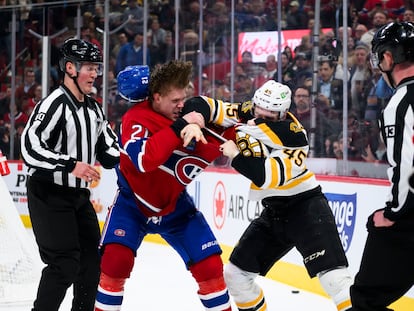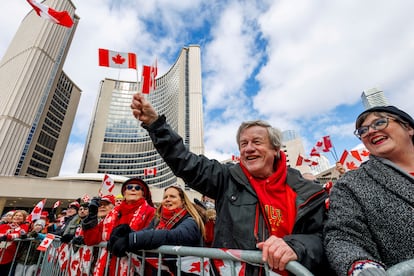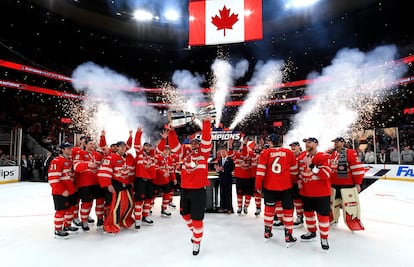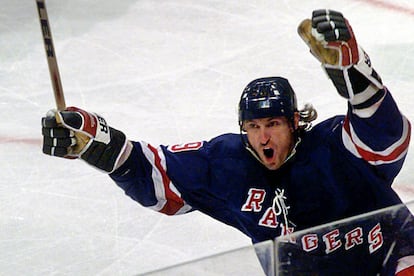Canadians put their elbows up: Hockey becomes a symbol of resistance against Trump
Tariffs and annexation threats revive sports legend Gordie Howe’s slogan proclaiming that the country will not hesitate to defend itself against attacks from the US president


At the entrance to the Bell Centre, Montreal’s hockey arena, the atmosphere last Thursday was that of a big game day. Not only because of the century-long rivalry between the home team, the Canadiens, and the U.S. Boston Bruins, two of the NHL’s original six teams, but also because there were seven games remaining in the regular season, and the Montrealers needed to win to make the playoffs. As for the Bruins, after a year to forget and nine consecutive losses, their only goal was honor, in not equaling their worst record in history. It wasn’t to be: at the end of a tense, at times rough game, they had lost again (4-1).
“When we play Boston, sparks always fly,” said Gerald Dubeau, wearing the red Canadiens jersey shortly before kickoff, “but it’s also the first game since Donald Trump’s tariffs went into effect [last Wednesday]. It’ll be interesting to see how the crowd reacts.” Mark Chabot went on to point out that no Canadian team has lifted the Stanley Cup since 1993. “And it’s time for the trophy to come home,” he added. After all, the International Hockey Federation considers the first game in history to have been played 150 years ago in Montreal.
For fans of the national sport — almost a religion — breaking that streak would be an act of poetic justice in a year in which Trump has challenged their right to exist amid bravado and provocation. The U.S. president has spent months fantasizing about turning his northern neighbor into the 51st state, calling its prime minister “governor” and imposing 25% tariffs on imported cars, steel, and aluminum. Such hostility has turned hockey into a space of resistance to the attacks from the noisy neighbor. When these began, crowds in stadiums across the country began booing the American anthem. They no longer do so with the intensity of a few weeks ago, but the expression “elbows up,” the rallying cry of national hero Gordie Howe, has become the motto of the Canadian counterattack.
Howe (1928-2016), aka “Mr. Hockey,” threw his elbows both on the ice and, metaphorically, in his life story, one of overcoming challenges: a humble boy from the Saskatchewan prairies who worked his way up to become “the greatest of all time.” He was known for being relentless on the ice and a gentleman off it. “If a guy slashed me, I’d grab his stick, pull him up alongside me and elbow him in the head,” he once declared. Like him, his fellow Canadians have decided to fight back: buying products Made in Canada, boycotting California wines and Kentucky bourbon in liquor stores, and canceling their late-winter vacations in the United States in search of warmth.

“Until recently, no one would have used the image of elbows outside of hockey,” acknowledges Toronto native Colin Horgan, who worked as a speechwriter for former prime minister Justin Trudeau. “Now it’s a political slogan, serving as a warning that, like Howe, we Canadians stand firm on the field and won’t be pushed around.”
The phrase, and the gesture, is everywhere in Canada. People repeat it on social media, and protesters raise their elbows at rallies named after Howe’s phrase. Comedian Mike Myers introduced it on U.S. television at the end of his recent appearance on Saturday Night Live, where he wore a T-shirt bearing another slogan of the new normal in the bilateral relationship: “Canada is not for sale.” Myers later endorsed the candidacy of the incumbent prime minister and Liberal Party leader, Mark Carney. Together, they launched the campaign dressed in the national team uniform in a video filmed on a hockey rink in which the politician tests the comedian to see how Canadian he is, given that he lives in the United States. At the end, they both say, “elbows up.”
“Normal guys”
In his speech accepting the challenge of becoming the leader of a country in the midst of its worst existential crisis in decades, Carney, a fan of the Edmonton Oilers, drew on his past as an amateur player. “In Canada, where the ice rink is a place of equalization and socialization, many prime ministers have used sports to send the message that they are normal guys,” Horgan says.
Perhaps none more so than Conservative Stephen Harper, who served as prime minister from 2005 to 2016 and published a well-researched book on the origins of hockey (A Great Game, 2013) while in office. This passion explains why Harper decided to name the new road infrastructure that — if the deadlines are met — will connect Canada and the United States near Detroit in the fall after Gordie Howe. Funded with federal money, authorities intend to use it to divert traffic from the iconic Ambassador Bridge, which was purchased in the late 1970s by a Michigan billionaire.
Hockey also has a long and storied tradition in the country’s foreign policy. During the Cold War, Canada and the United States’ confrontations with the Soviet Union were also an ice-bound struggle between capitalism and communism, in which the Russians often won: the “red army” claimed four consecutive Olympic gold medals, until the Americans broke the streak in 1980 with an achievement dubbed the “miracle on ice.”
The Cold War atmosphere blew once again on February 20 when Canada secured a 3-2 overtime victory over the USA. It was in the final of the newly formed 4 Nations friendly tournament, played in Boston. Perhaps nothing better illustrates the tension surrounding the event than the fact that three fights between players broke out in the opening nine seconds of the first game between the two teams in Montreal.

The fall from grace of a myth
Trudeau, who was still prime minister at the time, celebrated the victory with a message on X: “You can’t take our country — and you can’t take our game.” Before the game, Trump had written on his social media platform, Truth, that he would call the U.S. team to “spur them on towards victory against Canada:” “Someday, maybe soon” the message continued, “[Canada] will become our cherished, and very important, 51st State.”
It turns out Trump is a hockey fan, to the extent that in the late 1990s, he considered buying the Florida Panthers, a team that won the Stanley Cup last year, further proof of how much things have changed since the golden (frozen) days of Canadian dominance: the last 30 titles have been won by American teams, which command the most money (to, among other things, fill their rosters with Canadian players). The last two Stanley Cups have gone to cities (Las Vegas and Miami) that have practically never seen snow.

Trump is also friends with Canadian legend Wayne Gretzky, now the target of his compatriots’ ire. Gretzky, who has lived in California for decades, attended the new president’s inauguration in Washington and could be seen wearing a Make America Great Again cap that weekend. These gestures have sparked a petition (signed by nearly 14,000 people) to rename a highway in Edmonton, the city the centre led to four consecutive championships in the 1980s. A bronze statue of Gretzky at the Oilers’ stadium was spotted a couple of weeks ago covered in excrement.
His ties to Trump aren’t the only reason Gretzky is in the news. Washington Capitals left winger Alexander Ovechkin broke Gretzky’s NHL record of 894 goals on Sunday. “Will Washington fans care about his outspoken support for [Russian President Vladimir] Putin when Ovechkin shatters the record?” asks Horgan, Trudeau’s speechwriter.
Putin, an amateur hockey player, brought the sport into his recent call with Trump. According to the Kremlin, the U.S. president was open to the idea of resuming games between NHL teams and the Russian league, which were halted after the invasion of Ukraine in 2022. If successful, Moscow would not only score a point in the realm of soft power; the gesture would also serve, through the geostrategic medium of sport, as further evidence of Trump’s determination to distance himself from old allies, such as Canada, and embrace his eternal rival in order to shatter the post-1945 world order.
Sign up for our weekly newsletter to get more English-language news coverage from EL PAÍS USA Edition
Tu suscripción se está usando en otro dispositivo
¿Quieres añadir otro usuario a tu suscripción?
Si continúas leyendo en este dispositivo, no se podrá leer en el otro.
FlechaTu suscripción se está usando en otro dispositivo y solo puedes acceder a EL PAÍS desde un dispositivo a la vez.
Si quieres compartir tu cuenta, cambia tu suscripción a la modalidad Premium, así podrás añadir otro usuario. Cada uno accederá con su propia cuenta de email, lo que os permitirá personalizar vuestra experiencia en EL PAÍS.
¿Tienes una suscripción de empresa? Accede aquí para contratar más cuentas.
En el caso de no saber quién está usando tu cuenta, te recomendamos cambiar tu contraseña aquí.
Si decides continuar compartiendo tu cuenta, este mensaje se mostrará en tu dispositivo y en el de la otra persona que está usando tu cuenta de forma indefinida, afectando a tu experiencia de lectura. Puedes consultar aquí los términos y condiciones de la suscripción digital.








































